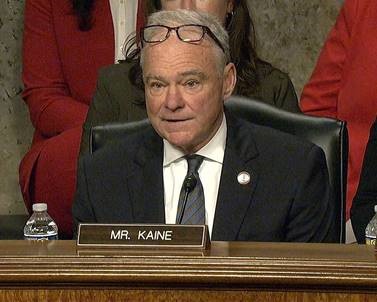Video: Kaine Delivers Opening Remarks at SASC Navy Posture Hearing

BROADCAST-QUALITY VIDEO OF KAINE’S EXCHANGE IS AVAILABLE HERE.
WASHINGTON, D.C. – Today, U.S. Senator Tim Kaine (D-VA), a member of the Senate Armed Services Committee (SASC), delivered opening remarks at the SASC hearing on U.S. Navy posture. During his remarks, he discussed his concerns about President Trump and Secretary Hegseth activating thousands of National Guard members and 700 Marines in California—over the objections of California Governor Gavin Newsom and Los Angeles Mayor Karen Bass—in response to immigration protests.
“I have a lot of experience in dealing with the [National] Guard as a former mayor and governor,” said Kaine. “The genius of the Guard is that it is a partnership between the President and the Governors and Guardsmen and women… The President’s decision to deploy thousands of Guardsmen and women to quell protests in Los Angeles—without a request by the California Governor and in fact, over the objection of the California Governor—is nearly unprecedented.”
Kaine continued, “We are in very, very dangerous territory. I think my colleagues and I are right to be concerned about this. The American public is concerned about this.”
“To deploy active duty Marines to quell civilian protests is, in my view, very, very dangerous,” said Kaine. “It’s dangerous beyond the escalatory effects that both the Governor and Mayor of Los Angeles are warning us about. If we screw up the balance of how we use the Guard or how we use the military in the instance of civilian protests that local law enforcement can handle, we will regret that for a very, very long time.”
“Many Americans are worried now that if they express dissenting voices to policies and the Administration, they’re concerned that the military may be deployed against them,” Kaine continued. “We’re coming up on the commemoration of 250 years of American democracy. It’s on the shoulders of this generation to decide whether the commemoration will be a celebration or a requiem or a wake or a coronation. We need to make it a celebration, and for that, we need brave and patriotic citizens who are willing to, without fear, exercise rights that were guaranteed to them from the very first days of this country.”
Then, Kaine rebutted comments from his colleague erroneously comparing Trump’s decision to activate the National Guard in California to President Dwight Eisenhower’s activation of the Arkansas National Guard to ensure the integration of Central High School in Little Rock.
“The issue is not is there lawless behavior that can be controlled by local law enforcement. You either believe in a federal system or you don’t where a Governor requests the National Guard or doesn’t, and you either believe in a civilian military division or you don’t,” Kaine said.
“Senator Cotton brings up the example of Little Rock. President Eisenhower, Republican President, did federalize the Guard in that instance. Why? Because it was the Governor that was violating federal law. There is no suggestion that Governor Newsom is violating federal law. In fact, he said, arrest me if I’m violating the law—and yesterday, the chief border agent for the United States said there is no cause to arrest you. You are not violating federal law,” said Kaine.
Kaine continued, “The right balance in this instance is to let a local official—mayor, governor—seek assistance if they need it. If the President decides if more assets are needed, we wouldn’t even be having this discussion if he sent in federal law enforcement—FBI, DEA. We’re having this discussion because the President in an unprecedented way, without a request and over the objection of the local elected leadership decided to send in the United States military.”
Kaine also raised concerns about the Trump Administration’s failure to submit a full budget request; delays with naval shipbuilding programs, including Virginia-class and Columbia-class submarines and amphibious assault ships; and the lack of the nomination from the Administration for a new Chief of Naval Operations (CNO). He also expressed his commitment to continuing to work with the Department of the Navy and other services on the implementation of provisions from the Brandon Act, which he helped get signed into law to make it easier for servicemembers to access mental health care.
“The Navy does remain the finest maritime force in the world, but it’s struggled to grow and maintain the fleet… Many vessels—aircraft carriers, multiple destroyers and frigates, and some of the air platforms—are behind schedule,” Kaine said. “In particular, the Virginia-class fast attack subs and Columbia-class ballistic missile submarines, which are so critical and prioritized very highly by all of you, are delayed and face budgetary challenges… We need to do more. I continue to believe that the most significant challenge we have is a workforce challenge.”
“The Brandon Act was passed by this body a number of years back—named after a young sailor, Brandon Caserta, who died by suicide in Norfolk,” said Kaine. “There were a lot of challenges and problems with, frankly, lack of access to mental health services, and it was a pivotal step toward improving access to mental health services, not just for the Navy, but everybody in the service. The implementations across the Armed Services—we’ve seen fits and starts, but some critical gaps in effectiveness, fragmented implementation, undefined procedures for mental health requests, lack of policies tailored toward the National Guard and Reserves… I would really love your help working to continue to implement this.”
###

